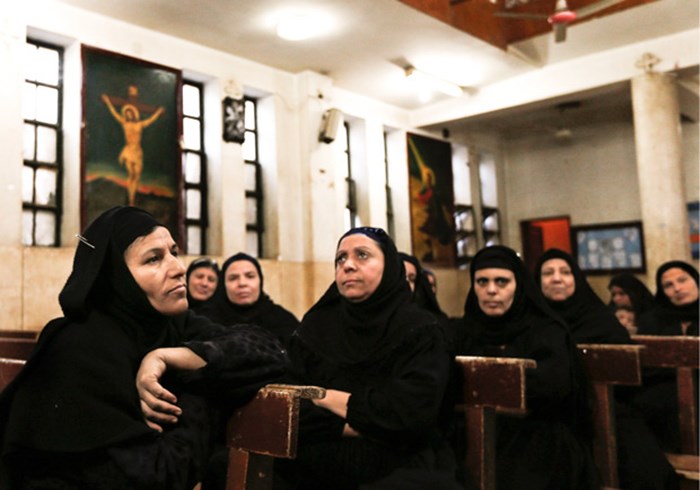
Egyptian Christians spent this year's Advent season awaiting more than the celebration of Jesus' birth. Christmas Day dawned with Copts still processing the rushed passage of a new Islamist-backed constitution and its implications.
Days before voting began on the hastily completed charter—which, despite only 33 percent turnout and accusations of fraud, passedDecember 25 with 64 percent of the vote—more than 10,000 Christians gathered at an interdenominational prayer vigil in Cairo's famous "Cave Church."
"Some of us see demonstrations and conspiracies. Some say this country is being destroyed or being stolen," said Andrawus Iskander, a Coptic Orthodox priest from the Nile Delta, to the gathered crowd. "But I say God is coming, and he will not be late. This year will be the best ever for the church. The heavens will open and we will be united. We will be freed from fear and learn to love."
But many Christians fear the worst.
"There will be violent threats coming against Copts, because the whole political scene has become sectarian," said Hani Labib, a Coptic political analyst. "No matter the issue, it is the Copts who are put in the limelight for their opposition [to the Islamist agenda]. Since most are unable to emigrate, this pressure will result in them returning to their isolation within the church."
Many Christians joined liberal activists and hardened revolutionaries to take to the streets prior to the referendum, demonstrating against the proposed constitution. With many others, Christians feared the limitation of rights and freedoms due to the wider scope of shari'ah law and the requirement to consult with unelected religious scholars on legislation.
President Mohamed Morsi's Islamist allies turned the Christian presence into a campaign slogan. They accused the opposition of treason and implied that the vast majority of protestors were Copts
"I say to the church, yes, you share this country with us," said Safwat Hegazi, an Islamist preacher and presidential appointee to the National Council for Human Rights. "But there are red lines, and our red lines are the legitimacy of Dr. Morsi."
He then employed a colloquial, but dangerous expression: "Whoever splashes it with water [discredits it], we will splash him with blood [spill his blood]."
"Morsi has not kept his promises to be a president for all Egyptians when he had a chance to do so, and he is losing credibility," said Ramez Atallah, president of the Bible Society of Egypt. "When the leader is not working for consensus, it makes it very hard for anyone else to do so."
Yet Atallah still advises Christians to remain politically active while grounding their expectations in the necessary dual perspective of Christianity.
"We must be good citizens," he said. "This panic is not justified in our faith, even if it may be justified in terms of politics.
"I am impressed that Christians, like all Egyptians, are more politically aware now than ever before—this must continue," Atallah said. "But we must never feel God is against us because we prayed for something and did not get it. It is very dangerous to connect the two."
Others place even more hope in political activism, despite the setback of failing to stop the new constitution from being approved.
"We have to work very hard to prepare for the parliamentary elections, because this is where all legislation will be fleshed out," said Youssef Sidhom, editor-in-chief of Coptic newspaper Watani. Important religious rights and liberties promised in the constitution threaten to be restricted by other Islamist-friendly clauses, he said.
Nevine Guirgis, a woman's leader with the liberal Social Democratic Party, agrees. Looking at the low turnout for the constitutional vote despite heavy campaigning by Islamists for shari'ah, she said, "It is clear Islamists are a minority that is trying to kidnap Egypt, and people are waking up to it. But this is not about fighting back; this is about building our future."
But as liberals have consistently failed to win at the polls, some place a morose hope in Egypt's expected financial difficulties to aid their parliamentary campaign.
"There is an economic disaster coming," said Michael Nabil, an Egyptian accountant. Since the revolution, Egypt has lost more than half of its foreign currency reserve fighting inflation and devaluation. "This will affect the situation negatively for the Muslim Brotherhood and give the opposition more credibility," he said.
Yet other Christians seek a more positive message and advocate focusing on society and social justice.
"We need to check in with the man on the street and see what he needs. Islamists do this, but we do not," said Bassem Victor, a Coptic activist working to build bridges with Egypt's ultraconservative Salafi Muslims. "We have to make clear we defend the rights of all—especially economically. If the people know Christians will defend others, they will also defend us."
Few Christians advocate what Labib fears will become a renewed isolation within church walls. Instead, many foresee a silver lining of renewed faith.
"There is no connection to political stability and the success of the gospel," said Atallah. "In fact, the opposite might be true: People depend more on God in difficult times."Maybe God will use the Muslim Brotherhood to do his will in Egypt, even if we don't want them to be in charge," he said.
In fact, for Simaan, who organized the prayer gathering in the cave church, Christians must include Islamists in their prayers and vision for Egypt.
"We are here tonight to pray for Egypt in all that it is going through, and let us pray with tears," he said as his voice boomed through the outdoor auditorium. "We pray for our brothers, both Christian and Muslim. We pray for our brothers, the Salafis and the Muslim Brothers." His words drew great applause.
Few Christians in the audience would applaud the politics of Islamists, but most have now become more politically aware. The Christian challenge for the coming year is to determine the best means of engagement.
"The Islamists have their shari'ah and their plans, and God will hold them accountable according to what they have received," said Simaan. "But he will hold [us] accountable for how [we] live with them."

Support Our Work
Subscribe to CT for less than $4.25/month


















